The good news from Greece – Letters from prison
Dear friends,
When ESI made a film about Thessaloniki in 2008 – Alexander's Shadow – Yannis Boutaris was an opposition member of the municipal council who had once run for mayor. It then seemed unlikely that he would ever be elected. At the time, Thessaloniki was more prosperous than ever in its history. It was also one of the most conservative cities in Greece.
In 2010, the debt crisis and the pain of austerity ripped through Greek politics, discrediting the political establishment. That year another film was made about Boutaris by Greek director Dimitris Athiridis: One Step Ahead. It showed a determined man campaigning as an independent candidate. He promised to clean up the city, in every sense. He assailed the corruption of his predecessor, who is now in jail. And he won the election for mayor by a mere 300 votes. In 2014 he was re-elected as mayor of Greece's second city by a huge margin.
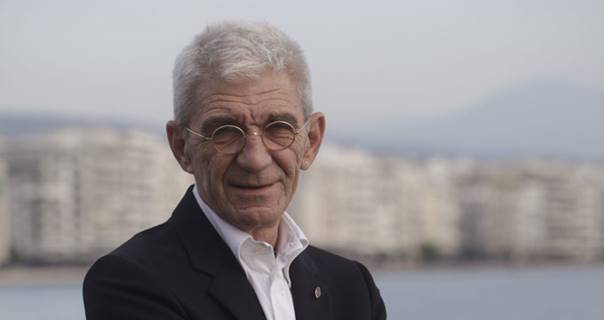 |
|
|
Yannis Boutaris, Mayor of Thessaloniki |
|
In the fifth part of the ESI essay series Return to Europe Revisited – supported by ERSTE Stiftung – we return to Thessaloniki:
The good news from Greece
Can Thessaloniki point the way?
We look at similarities between Yannis Boutaris (born in 1942), mayor of Thessaloniki, and Alexis Tsipras (born in 1974), Greece's new prime minister. Both are charismatic, unconventional, proudly secular and ready to defy taboos. Both ran for mayor in local elections in 2006, losing on that occasion by a wide margin: Tsipras won 10 percent of the vote in Athens; Boutaris 16 percent in Thessaloniki. In 2014, Boutaris gained 36 in the first round of local elections. Syriza won the same percentage in national elections in early 2015.
And yet in one respect, Boutaris remains in a category of his own: he is a reformer whom both Greek voters and outside observers have embraced as credible. European media tell the tale of a hero slaying fiscal monsters. Der Spiegel called him a "reform hero." The New York Times wrote that Boutaris "showed Athens how it is done." In 2014, The Economist praised his city's "exemplary" transformation. In short, Boutaris came to be the good news story from Greece.
Thessaloniki's rich history was linked to trade, to its port, to the sea and to the Balkan region. "In the past we had a cosmopolitan identity", Boutaris told ESI before he was elected. This, he was convinced, could be revived. It also made strong economic sense at a time of austerity.
After this election, armed with a democratic mandate, Boutaris set out to realise his vision of an open city. He visited Tel Aviv, fought for more direct flights from Turkey, for ferry connections to Izmir, for more cruise ships to dock in the port. He went on a tour of Balkan neighbours. He pushed for Thessaloniki to have a Durres park, Days of Izmir, a Muslim cemetery and a Holocaust Museum. In 2012, he strongly supported the city's first gay pride parade, which is now an annual event with growing participation.
These efforts had an immediate effect: the city experienced a tourism boom. In a Europe that had grown tired of tensions between Balkan neighbours, this cosmopolitan message also resonated loudly. As Boutaris put it in a speech in London in December 2014:
"I wonder if the Greek state could not have been equally bold and initiate a wider policy of friendship towards its neighbours This could have resulted not only in more income from potential visitors. It could also have reduced the levels of xenophobia as well as Greece's military expenditure. Despite the crisis, they are still among the highest in the world."
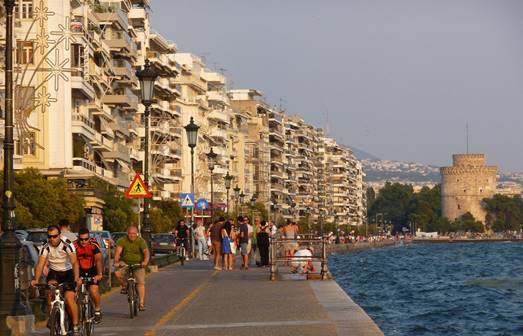 |
|
|
A Green City? |
|
As a mayor Boutaris focused on municipal services, bike lanes, sidewalks free from cars, solar panels for schools and the recycling of urban waste. Above all else he was working on fixing a dysfunctional administration. Once in office, he and his team found their worst fears confirmed. In many municipal agencies, there were no job descriptions and overemployment was flagrant. The average working time in the municipality was just four hours a day. Management systems, from port management to waste collection, were broken. Disorganised finances and weak accountability made theft easy. Tax was not being collected and the city had run up huge debts. In 2013, the previous mayor was found guilty of corruption and sentenced to life in prison (later reduced to twelve years).
Auditors were brought in, job descriptions drafted for the municipal administration and municipal finances reorganised. The number of municipal departments was reduced by a third; the number of deputy mayors cut by half. In 2011, city expenditures were reduced by a third. Arrears were paid off. The budget was balanced, "not because other people say so, but because our principle is to spend only what we have" (Boutaris).
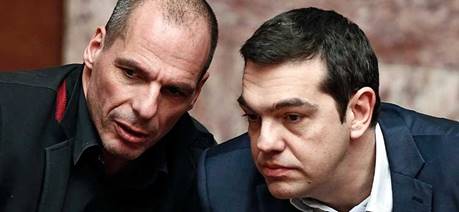 |
|
|
Looking to Thessaloniki? |
|
Today, a new Greek government faces Herculean tasks. It has to address a deep social crisis, create new employment, restore the confidence of investors and reform a demoralised public administration, all under conditions of stretched budgets. It must also retain the confidence of other governments. As Greek's finance minister told his Eurozone colleagues on 11 February in Brussels: "We must earn your trust without losing the trust of our people."
It remains to be seen whether, when it comes to challenging vested interests, balance budgets, gain international respect and, perhaps, even get re-elected in the end, the engineer Alexis Tsipras will be inspired by the winemaker Yannis Boutaris. And whether Athens will look, for once, for inspiration to Thessaloniki.
Letters from prison
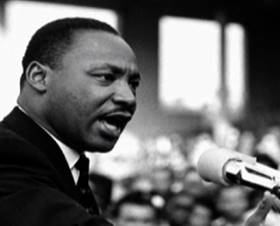 |
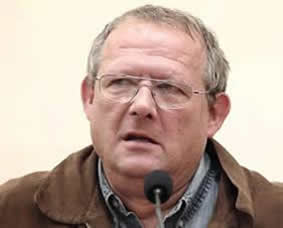 |
|
|
Martin Luther King – Adam Michnik |
||
In April 1963 Martin Luther King Junior wrote a letter from Birmingham prison. He explained to fellow clergymen, who had referred to his activities which had landed him in jail as "unwise and untimely", why he was in prison:
"I am in Birmingham because injustice is here … Injustice anywhere is a threat to justice everywhere. We are caught in an inescapable network of mutuality, tied in a single garment of destiny. Whatever affects one directly, affects all indirectly."
In 1985 Adam Michnik wrote a letter from Gdansk prison. It was the height of the cold war, and the democratic opposition in Poland had been violently suppressed:
"Our arrest, and the show trial that is now being prepared, are an expression of boundless faith in a social order built on lies and police repression. But they also prove that repression leads the government into a blind alley, at least in today's Poland.
Yes, it is possible to govern in this way. So long as geopolitics is favourable, this system may last for quite some time. But it cannot rid itself of the stigma of an alien, imposed garrison. Repression has lost its effectiveness. Our imprisonment does not frighten anyone, nor will anyone be enslaved by it."
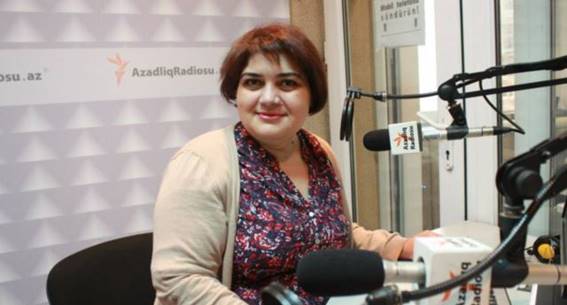 |
|
|
Khadija Ismayilova |
|
This February 2015 Khadija Ismayilova, an investigative journalist and human rights activist, published a letter from Kurdakhani prison in Azerbaijan, in the tradition of Martin Luther King, Adam Michnik and Vaclav Havel:
"Please forgive my long silence. I was put in solitary confinement after my last letter was passed through these prison bars and published …
I have not been allowed to see my family, either. The arbitrariness of the penitentiary system allows me two phone calls each week that I use to speak with my mother but, contrary to the law, denies her and my lawyer regular visits. I have access to very little information …
"Why am I here?" is a question that everyone in prison asks themselves, no matter the crime. Corruption is the reason I am in my prison, but the regime's corruption, not mine. The only way to prove oppressive regimes wrong is to continue exposing corruption, and I have promised more investigations for 2015. Yes, there is a price to pay, but it is worth it! My arrest proves one more time that we must build a new reality where telling the truth will not require courage.
This a country where money and power can cover up any crime, and where truth and deception have traded places. As a result, there are some 100 political prisoners behind bars in Azerbaijan. Think about the significance: In a very small, yet strategic and potentially volatile country bordering Russia and Iran, 100 of its best and brightest, its most aware, active and internationally engaged citizens have been removed from public life for the crime of seeking decency and fair play.
We also constantly ask ourselves where are we going, and what will we get in the end? In Kurdakhani prison, where I am now, the usual answer is three-to-five or five-to-12 years in jail. But my answer is that there is no end. The fight between good and evil goes on, and the most important thing is that this fight should not end. If we can continue to reject the thinking that is imposed on us and believe that human dignity is not for sale, then we are the winners, and they, our jailers both inside and outside prison, are the losers."
Khadija was arrested in December last year on fabricated charges, allegedly for inciting a colleague to attempt suicide. Last week, the government brought additional charges.
Last year human rights defender Leyla Yunus wrote A love letter from a jailed activist to her imprisoned husband. She also remains in jail.
The lack of reactions by the Council of Europe, the European Union and European democracies to the continued imprisonments of human rights defenders in Azerbaijan remains a shameful betrayal of the tradition of principled dissent. As Khadija put it, concluding her letter:
"Prison is not frightening for those trying to right a twisted scale, or for those who are subject to threats for doing the right thing. We see clearly what we must fight for. Life is very complicated, but sometimes we get lucky and are offered a clear choice, between truth and lies. Choose truth and help us."
Many best regards,

Gerald Knaus
- ESI essays Return to Europe Revisited: Romania, Kosovo, Turkey, Bulgaria, Greece
- Rumeli Observer: Cosmopolitan visionary – Boutaris and Thessaloniki (12 October 2014)
- Opinion piece by Khadija Ismayilova in the The Washington Post: A letter from an Azerbaijani prison (18 February 2015)
- ESI newsletter: 2014 and the threat to Sakharov's legacy (16 October 2014)
- ESI newsletter: The LIST and arrests in Baku – Sakharov prize 2014 – Black Sea in Budapest – Capacity building in Kosovo (4 September 2014)
- To watch One Step Ahead (on the 2010 Thessaloniki elections) go here
